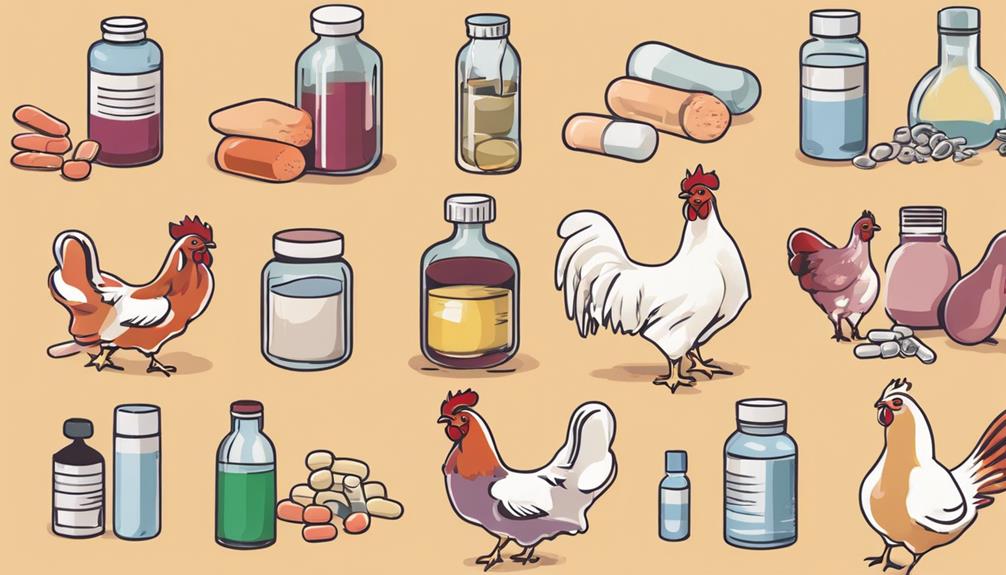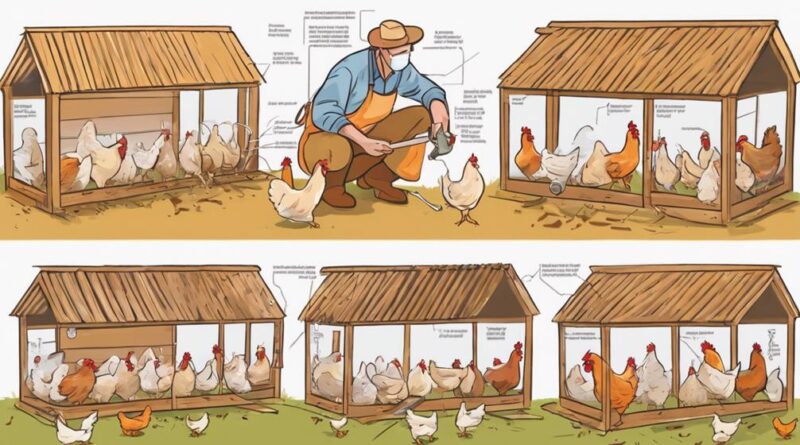Top Tips for Effective Chicken Vaccination and Medication"
To ensure top-notch health for your flock, start by mastering vaccination and medication techniques. Vaccinating chickens creates a shield against diseases, boosting immunity. Proper handling of vaccines — store them between 35°F and 45°F — ensures potency. Administer following exact guidelines for secure protection. Buil a schedule based on age and disease risks. Watch for illness signs like behavior changes or abnormal droppings. Use Ivermectin for parasite control and medications like Tylan for respiratory issues. Remember, consulting a veterinarian tailors plans to your flock's needs truly enhances their wellness. Your chickens' health is worth the effort!
Importance of Vaccinating Your Chickens
To ensure the health and well-being of your chickens, vaccinating them is a crucial step in disease prevention. Disease prevention plays a vital role in maintaining the overall flock health and productivity of your poultry. Immunization benefits not only the individual chicken but also the entire flock by reducing the risk of disease outbreaks that can significantly impact poultry productivity.
Vaccinating your chickens helps in building their immunity against specific diseases, thus lowering the chances of infections spreading within the flock. By taking proactive measures through vaccination, you can safeguard your chickens from potentially harmful illnesses, ensuring they lead healthy lives and contribute to the overall flock health.
When diseases strike a flock, it not only affects the sick chickens but can also lead to a decrease in egg production, stunted growth, and in severe cases, mortality. By prioritizing vaccination as a preventative measure, you're investing in the long-term well-being and productivity of your poultry.
Understanding Common Chicken Diseases
Understanding common chicken diseases is key to protecting the health and productivity of your poultry flock. Disease prevention through proper biosecurity measures is essential to maintain a healthy environment for your chickens. By being aware of the symptoms and treatment options for these diseases, you can act promptly to safeguard your flock.
One common disease among chickens is Infectious Bronchitis, which can cause respiratory issues, decreased egg production, and poor egg quality. Symptoms include coughing, sneezing, and nasal discharge. Treatment involves supportive care and isolating infected birds to prevent the spread of the virus.
Another prevalent disease is Marek's Disease, a highly contagious viral illness that affects the nervous system and organs. Symptoms may include paralysis, weight loss, and tumors. Unfortunately, there's no cure for Marek's Disease, so prevention through vaccination is crucial.
Coccidiosis is a parasitic disease that affects the intestinal tract of chickens, leading to diarrhea, decreased growth, and even death. Treatment involves medications such as coccidiostats to control the parasite population.
Proper Handling and Storage of Vaccines
Proper handling and storage of vaccines is essential to maintain their effectiveness and ensure the health of your chicken flock. When it comes to proper storage, vaccines should be kept in a refrigerator between 35°F and 45°F (2°C and 7°C) unless otherwise specified by the manufacturer. It's crucial to protect vaccines from freezing as well as high temperatures, as this can lead to a loss of potency.
Handling of vaccines is a delicate process. Always check the expiration dates and the condition of the vaccines before use. Shake the vaccines gently to ensure they're well mixed but avoid vigorous shaking, as this can damage the vaccine. When transporting vaccines, use insulated containers with ice packs to maintain the recommended temperature range.
Temperature control is key to maintaining vaccine efficacy. Monitor the refrigerator temperature regularly with a thermometer dedicated to vaccine storage. Remember that vaccines are sensitive and can lose their effectiveness if exposed to improper temperatures.
Administering Vaccines Safely and Effectively
When administering vaccines to your chicken flock, ensure meticulous attention to detail and precision to guarantee their safety and effectiveness. Proper techniques play a crucial role in ensuring that vaccines are administered safely and effectively to your chickens.
Here are some essential guidelines to follow:
- Proper Handling: Before administering any vaccine, make sure to read the manufacturer's instructions carefully. Follow the recommended storage conditions and expiration dates to maintain the vaccine's efficacy. Improper storage can lead to vaccine failure and ineffective immunization.
- Correct Administration: Use sterile equipment when preparing and administering vaccines. Follow the recommended dosage and route of administration specified by the manufacturer. Proper injection technique is vital to ensure that the vaccine reaches its intended target and provides adequate protection.
- Vaccine Safety: Always prioritize the safety of your chickens when administering vaccines. Check for any adverse reactions post-vaccination and be prepared to provide necessary care if needed. Monitor your flock closely after vaccination to ensure they're responding well to the immunization.
Creating a Vaccination Schedule for Your Flock
To effectively protect your chicken flock from diseases, establishing a well-structured vaccination schedule is imperative. Proper vaccine timing and dosage are crucial elements in ensuring the effectiveness of the immunization process. Vaccines work by stimulating the chicken's immune system to produce antibodies that provide immunity against specific diseases.
When creating a vaccination schedule, it's essential to consider the age of your chickens, the prevalence of diseases in your area, and the specific needs of your flock. Different vaccines have varying effectiveness durations, so it's important to follow recommended re-vaccination timelines to maintain immunity levels.
Administering vaccines at the correct dosage is vital to ensure that chickens receive adequate protection without harmful side effects. Under-dosing can lead to incomplete immunity, leaving your flock vulnerable to diseases, while over-dosing can cause adverse reactions.
Regularly reviewing and updating your vaccination schedule based on changes in your flock's health status and disease prevalence in your area is critical to maintaining a healthy flock. By following a well-structured vaccination schedule that considers vaccine timing, dosage, and effectiveness, you can help safeguard your chickens and promote their overall well-being.
Recognizing Signs of Illness in Chickens
Recognize signs of illness in your chickens by observing changes in their behavior, appearance, and overall condition. Early intervention is crucial in maintaining the health of your flock and preventing the spread of diseases. Chickens are adept at hiding signs of illness, so it's essential to be vigilant.
One common sign of illness in chickens is a change in their eating or drinking habits. If you notice a decrease in food or water consumption, it could indicate an underlying issue. Keep an eye out for any sudden weight loss or lethargy, as these are also red flags. Additionally, observe their droppings; any significant changes in color, consistency, or frequency could signal a health problem.
Physical symptoms such as abnormal discharges from the eyes, nostrils, or vent shouldn't be overlooked. Check for any signs of respiratory distress like coughing, sneezing, or wheezing. Monitor your chickens for unusual behaviors like isolation from the flock, decreased egg production, or drooping wings.
Choosing the Right Medications for Your Chickens

Consider consulting with a poultry veterinarian to determine the most suitable medications for the health and well-being of your chickens. When it comes to choosing the right medications for your flock, there are several medication options available to address various health issues that chickens may encounter.
For common bacterial infections, antibiotics like Tetracycline or Amoxicillin can be effective. It's crucial to follow dosage guidelines carefully to ensure the medication is administered correctly. Overuse or incorrect dosage of antibiotics can lead to antibiotic resistance in your flock.
Antiparasitic medications such as Ivermectin can help control internal and external parasites like worms, mites, and lice. These medications come in various forms like oral solutions or powders, and dosage guidelines are usually based on the weight of the chicken.
In cases of respiratory issues, medications like Tylan or Tylosin can be used to treat conditions like chronic respiratory disease. These medications can be administered through the water supply or injection, following the recommended dosage instructions.
Consulting a Veterinarian for Guidance
When seeking guidance on chicken vaccination and medication, consulting a poultry veterinarian is crucial for tailored advice and recommendations based on your flock's specific needs and health conditions. Veterinary expertise plays a vital role in ensuring disease prevention and overall health management for your chickens. Here are some key reasons why consulting a veterinarian is essential:
- Customized Vaccination Plans: A poultry veterinarian can assess your flock's unique requirements and design a vaccination schedule that addresses prevalent diseases in your area. This tailored approach enhances the effectiveness of the vaccines and reduces the risk of outbreaks.
- Early Disease Detection: Professional guidance from a veterinarian allows for early detection of potential health issues within your flock. Regular check-ups and diagnostic tests can help identify diseases in their early stages, enabling prompt treatment and preventing the spread of illnesses.
- Treatment Recommendations: In addition to preventive measures, a veterinarian can recommend appropriate medications for treating specific health conditions in your chickens. Their expertise ensures that the medications prescribed are safe, effective, and administered correctly, promoting the swift recovery of sick birds.
Consulting a poultry veterinarian empowers you to make informed decisions regarding the health and well-being of your chickens, ultimately contributing to a thriving and disease-resistant flock.
Frequently Asked Questions
Can Vaccines Be Effective if My Chickens Were Previously Sick?
If your chickens were previously sick, vaccines can still be effective in helping them develop immunity and supporting their recovery process.
Vaccines aid in disease prevention and are essential for maintaining your chickens' health. By following proper vaccination protocols, you can ensure that your flock stays healthy and protected against common poultry illnesses.
Consult with a veterinarian for guidance on the best vaccination plan for your specific situation.
Are There Any Alternative Vaccination Methods for Chickens?
When looking for alternative vaccination methods for your chickens, consider herbal remedies like Echinacea supplements, homeopathic options, or even acupuncture. These methods can complement traditional vaccines and boost your chickens' immune system.
Always consult with a veterinarian before trying new approaches to ensure the health and safety of your flock. Integrating these holistic practices may provide additional protection and support for your chickens' well-being.
How Do Environmental Factors Impact Vaccine Effectiveness?
Environmental factors play a crucial role in vaccine effectiveness for chickens. Temperature regulation is key for maintaining a robust immune response, while humidity levels can impact disease resistance.
Ensuring optimal conditions in the chicken coop will help vaccines work more efficiently, leading to better protection against illnesses. By paying attention to these factors, you can enhance the overall health and well-being of your flock.
What Should I Do if My Chickens Have a Reaction to a Vaccine?
If your chickens have a reaction to a vaccine, it's crucial to act swiftly. Treatment options for allergic reactions may include antihistamines or corticosteroids under veterinary guidance.
Prevention strategies involve following proper vaccine protocols, ensuring vaccines are stored correctly, and monitoring your chickens post-vaccination for any adverse effects.
It's essential to consult with a poultry veterinarian to determine the best course of action for your chickens' health and well-being.
Are There Specific Medications That Can Be Used in Combination With Vaccines?
When considering medication options to use with vaccines for your chickens, timing is crucial. Certain combination therapies can benefit your flock by enhancing the effectiveness of the vaccines.
By administering medications at the right time in conjunction with the vaccines, you can provide additional support to your chickens' immune systems and ensure they stay healthy.
It's important to consult with a veterinarian to determine the best medication plan for your specific situation.
Conclusion
Now that you have learned the top tips for effective chicken vaccination and medication, you're well-equipped to keep your flock healthy and thriving.
Remember the importance of proper handling and storage of vaccines, administering them safely, and creating a vaccination schedule.
Recognizing signs of illness and choosing the right medications are crucial for maintaining the well-being of your chickens.
Consult with a veterinarian for guidance to ensure the best care for your feathered friends.
